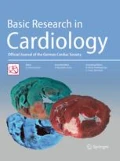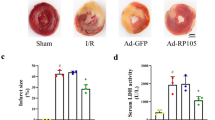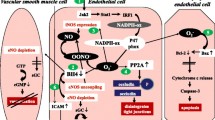Abstract
Background
Previous studies have shown that the disruption of the coronary endothelium and the increase in its permeability during ischemia-reperfusion (I/R), are linked to matrix metalloproteinase-2 (MMP-2) activity. Studies from our group have shown that during I/R, activity of MMP-2 in the coronary effluent increases and this increase is associated with cardiac dysfunction, which in turn, can be prevented by MMP inhibitors. Therefore, we hypothesize that inhibiting MMPs reduces the MMP-2 dependent disruption of the coronary endothelium and subsequent protein release during I/R.
Methods
Isolated rat hearts were perfused in the Langendorff mode at a constant pressure and subjected to 15, 20 or 30 min no-flow ischemia followed by 30 min of reperfusion. The MMP inhibitors, o-phenanthroline (Phen, 100 µM) or doxycycline (Doxy, 30 µM) an inhibitors of MMPs, were added to the perfusion solution 10 min before ischemia and for the first 10 min of reperfusion. The coronary effluents were collected during perfusion for protein analysis. Creatine kinase was measured as an index of cellular damage. Endothelial integrity was assessed by measuring coronary flow and by measuring the levels of serotransferrin and interstitial albumin in the coronary effluent. Additionally, damage to the endothelium was assessed histologically by light microscopy analysis of the cellular structure of the myocardium. MMP-2 activity was measured by zymography in hearts subjected to 15, 20 and 30 min of ischemia without reperfusion.
Results
MMP-2 activity was increased in heart tissue at the end of ischemia and was correlated with duration of ischemia. The post-ischemia decrease in coronary flow, and the increase in the release of serotransferrin and albumin were attenuated by Phen. Edema (another indirect marker of endothelial damage) was observed in I/R heart and the edema was abolished in I/R heart treated with MMP inhibitors.
Conclusion
MMP inhibition not only reduces cardiac mechanical dysfunction but also reduces endothelial damage resulting from cardiac I/R injury.









Similar content being viewed by others
Abbreviations
- I/R:
-
Ischemia-reperfusion
- MMPs:
-
Matrix metalloproteinases
- Phen:
-
o-Phenanthroline
- Doxy:
-
Doxycycline
References
Arrell DK, Neverova I, Fraser H, Marban E, Van Eyk JE (2001) Proteomic analysis of pharmacologically preconditioned cardiomyocytes reveals novel phosphorylation of myosin light chain 1. Circ Res 89:480–487
Arrell DK, Niederlander NJ, Perez-Terzic C, Chung S, Behfar A, Terzic A (2007) Pharmacoproteomics: advancing the efficacy and safety of regenerative therapeutics. Clin Pharmacol Therapeut 82:316–319
Carden DL, Granger DN (2000) Pathophysiology of ischemia: reperfusion injury. J Pathol 190:255–266
Cheung PY, Sawicki G, Wozniak M, Wang W, Radomski MW, Schulz R (2000) Matrix metalloproteinase-2 contributes to ischemia-reperfusion injury in the heart. Circulation 101:1833–1839
Corbett JM, Why HJ, Wheeler CH, Richardson P, Archard LC, Yacoub MH, Dunn JD (1998) Cardiac protein abnormalities in dilated cardiomyopathy detected by two-dimensional polyacrylamide gel electrophoresis. J Electrophoresis 19:2031–2042
Dauber IM, Pluss WT, VanGrondelle A, Trow RS, Weil JV (1985) Specificity and sensitivity of noninvasive measurement of pulmonary vascular protein leak. J Appl Physiol 59:564–574
Dejana E, Bazzoni G, Lampugnani MG (1999) Vascular endothelial (VE)-cadherin: only an intercellular glue? Exp Cell Res 252:13–19
Gallagher G, Menzie S, Huang Y, Jackson C, Hunyor SN (2007) Regional cardiac dysfunction is associated with specific alterations in inflammatory cytokines and matrix metalloproteinases after acute myocardial infarction in sheep. Basic Res Cardiol 102:63–72
Garcia SC, Pomblum V, Gams E, Langenbach MR, Schipke JD (2007) Independency of myocardial stunning of endothelial stunning? Basic Res Cardiol 102:359–7367
Gasche Y, Copin JC, Sugawara T, Fujimura M, Chan PH (2001) Matrix metalloproteinase inhibition prevents oxidative stress-associated blood-brain barrier disruption after transient focal cerebral ischemia. J Cereb Blood Flow Metab 21:1393–1400
Geissler HJ, Mehlhorn U, Laine GA, Allen S (2001) Myocardial fluid balance. Eur J Cardiothorac Surg 20:1220–1230
Grisham MB, Granger DN, Lefer DJ (1998) Modulation of leukocyte–endothelial interactions by reactive metabolites of oxygen and nitrogen: relevance to ischemic heart disease. Free Radic Biol Med 25:404–433
Gu Z, Kaul M, Yan B, Kridel SJ, Cui J, Strongin A, Smith JW, Liddington RC, Lipton SA (2002) S-Nitrosylation of matrix metalloproteinases: signaling pathway to neuronal cell death. Science 297:1186–1190
Hack CE, Zeerleder S (2001) The endothelium in sepsis: source of and a target for inflammation. Crit Care Med 29:21–27
Harpers SJ, Bates DO (2003) Endothelial permeability in uremia. Kidney Int 63:41–44
Heinke M, Wheeler C, Chang D, Einstein R, Drake-Holland A, Dunn M (1998) Protein changes observed in pacing induced heart failure using two-dimensional electrophoresis. Electrophoresis 19:2021–2030
Heinke M, Wheeler C, Yan J, Amin V, Chang D, Einstein R, Dunn MJ, dos Remedios CG (1999) Changes in myocardial protein expression in pacing-induced canine heart failure. Electrophoresis 20:2086–2093
Jager D, Jungblut PR, Muller-Werdan U (2002) Separation and identification of human heart proteins. J Chromatogr B Analyt Tech Biomed Life Sci 771:131–153
Jiang L, Tsubakihara M, Heinke MY, Yao M, Dunn MJ, Phillips W, dos Remedios CG, Nosworthy NJ (2001) Heart failure and apoptosis: electrophoretic methods support data from micro- and macro-arrays. A critical review of genomics and proteomics. Proteomics 1:1481–1488
Lalu MM, Csont T, Schulz R (2004) Matrix metalloproteinase activities are altered in the heart and plasma during endotoxemia. Crit Care Med 32:1332–1337
Lalu MM, Pasini E, Schulze CJ, Ferrari-Vivaldi M, Ferrari-Vivaldi G, Bachetti T, Schulz R (2005) Ischaemia-reperfusion injury activates matrix metalloproteinases in the human heart. Eur Heart J 26:27–35
Lalu MM, Cena J, Chowdhury R, Lam A, Schulz R (2006) Matrix metalloproteinase contribute to endotoxin and interleukin-1β induced vascular dysfunction. Br J Pharmacol 149:31–42
Lang SC, Elsasser A, Scheler C, Vetter S, Tiefenbacher CP, Kubler W, Katus HA, Vogt AM (2006) Myocardial preconditioning and remote renal preconditioning-identifying a protective factor using proteomic methods? Basic Res Cardiol 101:149–158
Larsen M, Roepstorff P (2000) Mass spectrometric identification of proteins and characterization of their post-translational modifications in proteome analysis. Anal Chem 366:677–690
Lyngbaek S, Schneider M, Hansen JL, Sheikh SP (2007) Cardiac regeneration by resident stem and progenitor cells in the adult heart. Basic Res Cardiol 102:101–114
McCarty MF (2004) Vascular endothelium is the organ chiefly responsible for the catabolism of plasma asymmetric dimethylarginine—an explanation for the elevation of plasma ADMA in disorders characterized by endothelial dysfunction. Med Hypotheses 63:699–708
Okamoto T, Akaike T, Sawa T, Miyamoto Y, van der Vliet A (2001) Activation of matrix metalloproteinases by peroxynitrite-induced protein S-glutathiolation via disulfide S-oxide formation. J Biol Chem 276:29596–29602
Penna C, Rastaldo R, Mancardi D, Raimondo S, Cappello S, Gattullo D, Losano G, Pagliaro P (2006) Post-conditioning induced cardioprotection requires signaling through a redox-sensitive mechanism, mitochondrial ATP-sensitive K+ channel and protein kinase C activation. Basic Res Cardiol 101:180–189
Perkins DN, Pappin DJ, Creasy DM, Cottrell JS (1999) Probability-based protein identification by searching sequence databases using mass spectrometry data. Electrophoresis 20:3551–3567
Sawicki G, Salas E, Murat J, Miszta-Lane H, Radomski MW (1997) Release of gelatinase A during platelet activation mediates aggregation. Nature 386:616–619
Sawicki G, Dakour J, Morrish DW (2003) Functional proteomics of neurokinin B in the placenta indicates a novel role in regulating cytotrophoblast antioxidant defences. Proteomics 3:2044–2051
Sawicki G, Leon H, Sawicka J, Sariahmetoglu M, Schulze CJ, Scott PG, Szczesna-Cordary D, Schulz R (2005) Degradation of myosin light chain in isolated rat hearts subjected to ischemia-reperfusion injury, a new intracellular target for matrix metalloproteinase-2. Circulation 112:544–552
Sawicki G, Udenberg T, Lalu M, Schulz R (2006) A Proteomic approach for the investigation of myocardial protein changes in sepsis. J Mol Cell Cardiol 40:899
Schulz R (2007) Targets of matrix metalloproteinase-2 in cardiac disease: rationale and therapeutic approaches. Annu Rev Pharmacol Toxicol 47:211–242
Schwertz H, Langin T, Platsch H, Richert J, Bomm S, Schmidt M, Hillen H, Blaschke G, Meyer J, Darius H, Buerke M (2002) Two-dimensional analysis of myocardial protein expression following myocardial ischemia and reperfusion in rabbits. Proteomics 2:988–995
Seal JB, Gewertz BL (2005) Vascular dysfunction in ischemia-reperfusion injury. Ann Vasc Surg 19:572–584
Soccal PM, Gasche Y, Pache JC, Schneuwly O, Slosman DO, Morel DR, Spiliopoulos A, Suter PM, Nicod LP (2000) Matrix metalloproteinases correlate with alveolar-capillary permeability alteration in lung ischemia-reperfusion injury. Transplantation 70:998–1005
Spinale FG (2007) Myocardial matrix remodeling and the matrix metalloproteinases: influence on cardiac form and function. Physiol Rev 87:1285–342
Szocs K (2004) Endothelial dysfunction and reactive oxygen species production in ischemia/reperfusion and nitrate tolerance. Gen Physiol Biophys 23:265–295
Wang W, Sawicki G, Schulz R (2002) Peroxynitrite-induced myocardial injury is mediated through matrix metalloproteinase-2. Cardiovasc Res 53:165–174
Wang W, Schulze CJ, Suarez-Pinzon WL, Dyck JR, Sawicki G, Schulz R (2002) Intracellular action of matrix metalloproteinase-2 accounts for acute myocardial ischemia and reperfusion injury. Circulation 106:1543–1549
Wu MH (2005) Endothelial focal adhesions and barrier function. J Physiol 569:359–366
Acknowledgments
We thank Dr. J. S Richardson for help with manuscript preparation. This work was supported by grants from Canadian Institutes of Health Research and the Heart and Stroke Foundation of Canada.
Author information
Authors and Affiliations
Corresponding author
Additional information
Returned for 1. Revision: 13 December 2007 1. Revision received: 17 March 2008
Returned for 2. Revision: 3 April 2008 2. Revision received: 8 April 2008
J. Fert-Bober and H. Leon contributed equally to this work.
Rights and permissions
About this article
Cite this article
Fert-Bober, J., Leon, H., Sawicka, J. et al. Inhibiting matrix metalloproteinase-2 reduces protein release into coronary effluent from isolated rat hearts during ischemia-reperfusion. Basic Res Cardiol 103, 431–443 (2008). https://doi.org/10.1007/s00395-008-0727-y
Received:
Accepted:
Published:
Issue Date:
DOI: https://doi.org/10.1007/s00395-008-0727-y




